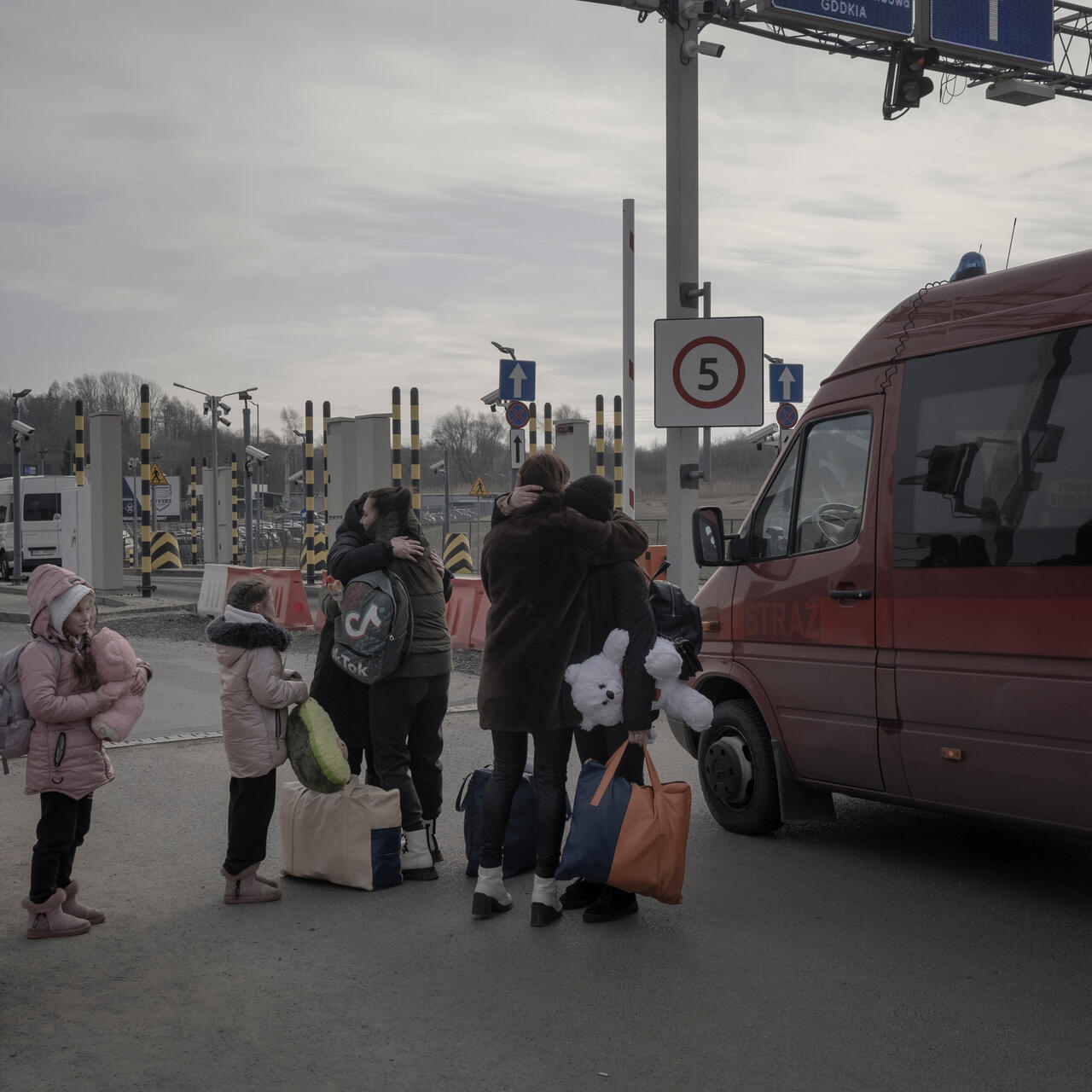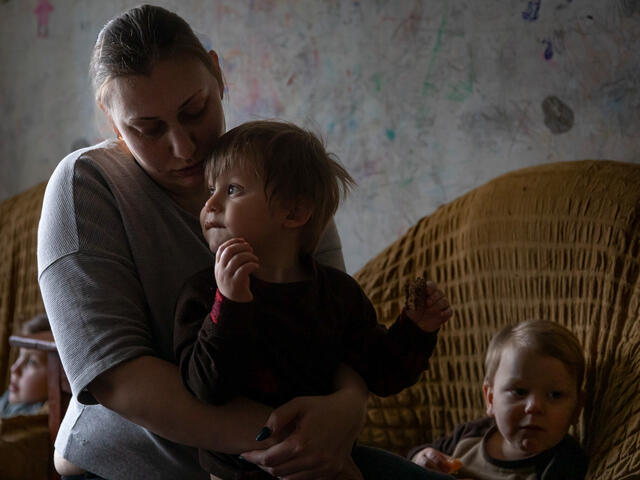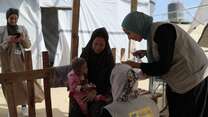
For almost 90 years, the International Rescue Committee (IRC) has been responding to the world’s worst humanitarian crises. When a new crisis strikes, the IRC’s emergency team swiftly activates to determine the most effective way to reach people in need.
Our response to Russia’s invasion of Ukraine, which has killed thousands of civilians and displaced millions of people so far, is no different. Our team quickly deployed to neighboring Poland, where we are working with partners to assist arriving refugees. We are also working with partners inside Ukraine, supporting the evacuation of women and children and providing emergency aid to people who had to flee their homes.
Even before the attacks on Ukraine, the world had been facing unprecedented humanitarian needs. A record 82 million people around the world have been uprooted by crises. Some 41 million people in 43 countries are on the brink of famine. Wars around the world are lasting longer and becoming more complex, with civilians paying the price.
Against this backdrop, and with so many urgent crises in the world, how does the IRC decide whether to respond to an emergency? How do we choose what aid we will deliver? And what is the best way to support our work?
Below, our emergency team answers some of our supporters’ most common questions. We will update this space with new details on our Ukraine emergency response as they come in.
What does the IRC consider an emergency?
The IRC defines emergencies as "emerging humanitarian crises or deteriorating situations in which existing services are overwhelmed and communities’ access to basic needs are unmet.”
Emergencies can be man-made crises—such as the Russian invasion of Ukraine or the conflict in Syria—or natural disasters, such as the 2011 earthquake and tsunami in Japan or the ongoing drought in East Africa. Emergencies can strike suddenly, or they can build up over time.
How does the IRC prepare for emergencies?
Our emergency team monitors emerging crises throughout the year. We create assessments of countries, including for our annual Emergency Watchlist of the 20 humanitarian crises most likely to deteriorate in the year ahead.
The IRC emergency team also works with our program teams in 40+ countries around the world. We help them to create crisis plans and train them in how to respond to emergencies so they are ready to act at a moment’s notice.
In addition, our global emergency specialists—doctors, engineers, social workers and logisticians—are on standby ready to deploy within 72 hours. The emergency team’s work is supported by flexible funding from IRC supporters as well as a dedicated Crisis Response Fund.

How does the IRC decide to respond to an emergency?
When an emergency strikes, we aim to answer two key questions: first, how severe is the crisis? And second, should the IRC respond? Our emergency team uses concrete data to make that decision.
To understand the severity of a crisis, we look at the available information, such as the number of people killed, the number injured, the number displaced from their homes, and the number affected in other ways. Then we look at the resources the community affected by crisis already has, such as support from the government or local organizations, and determine if the IRC’s expertise and resources are needed.
“If we’re on our game, it takes less than one-half hour to make a decision to go into a completely new country,” said IRC director of emergencies Bob Kitchen in a 2018 episode of the IRC podcast Displaced.
How does the IRC decide what aid to provide?
We ask the people who are directly impacted by the crisis. They are the most important experts. Our emergency response won’t be successful unless we listen to them and understand exactly what they need.
“We know from decades of experience that if we come in and just project our knowledge and our values onto a crisis, we’re going to end up doing the wrong thing at the wrong time,” said Kitchen. “And those activities won’t be embraced, and they won’t make a difference. They won’t save lives because they’re not the people’s priorities.”
We also rely on information from IRC colleagues working in countries where we already have a presence. Ninety-nine percent of staff in each of our country programs come from those countries and serve their own communities. During a crisis, they work alongside the emergency team and provide critical local insights.
Where the IRC doesn’t already have a presence in a country, we talk to communities and to groups that may include local nonprofits and government officials. We try to get up to speed on people’s needs as quickly as possible while also moving rapidly to provide vital aid.
Often, the IRC partners with and provides support to local organizations already active on the ground. This bolsters the crisis response of people who have already been working in the community and are experts on the local context.
“It’s a process that can be summed up in three words,” said Kitchen. “We ask. We listen. And we act.”
What do people impacted by the war in Ukraine need?
Since the Russian invasion of Ukraine started on February 24, bombs and shelling have continued to escalate—deliberately targeting civilians, residential buildings, hospitals and essential infrastructure. Thousands of people are left without adequate water or electricity. Many can’t reach markets to buy food and basic supplies amid the destruction.
More than 6 million people have now fled Ukraine to seek safety in neighboring countries. The majority are women, children and elderly people. Huge numbers of people continue to arrive at Ukraine’s borders with Poland, Romania, Hungary, Slovakia and Moldova with only what they can carry. In many places there have been long waits to cross and scant facilities waiting for them on the other side, with temperatures dropping below freezing overnight. Urgent needs include food, water, emergency shelter, health care and sanitation facilities, and protection and trauma counseling.
Over 8 million people remain displaced inside the country. A further 12 million could be stranded or are unable to leave Ukraine due to increasing violence, destruction of bridges and roads, as well as lack of resources or information on where to find safe shelter.
How is the IRC helping in Ukraine?
In Ukraine, we are supporting evacuation efforts for women and children, providing psychological care and delivering groceries, blankets, warm clothes, stoves, cash and other essentials to displaced families.
The IRC is also on the ground in Poland working with three local organizations to meet the needs of families displaced from Ukraine, many of whom are staying in shelters across the country. Working with partners allows us to bolster the crisis response of people who have already been active in the community and are experts on the local context.
- With the Polish Red Cross, we are providing bedding, toiletries, mental health support and other emergency assistance to people arriving at border crossings or continuing their journeys into Poland from relocation points.
- We are working with the Polish Forum for Migration to provide newly arrived refugees with information on their rights and available assistance, as well as provide in-person and remote mental health support from trained psychologists.
- The IRC and the Polish Center for International Aid (PCPM) are delivering cash support to families living in cities including Lublin, Gdańsk, Łódź, and Poznań, to ensure they can buy food, medicine, clothing and other essentials.
- We are working with partners to set up Safe Healing and Learning Spaces across nine shelters in Warsaw, which will provide families, and children in particular, the space they need to recover from the trauma they have endured.
- With PCPM, we are connecting Ukrainian teachers with jobs in Poland and delivering cash support to ensure their salaries. This approach means that teachers can work flexibly and teach in schools where Ukrainian language skills are most needed.
- We are working to help children who arrived as refugees integrate into Polish classrooms, providing cultural assistants and other support.
- A new grant by Google.org and a Google.org Fellowship team will help the IRC support United for Ukraine, an information portal and civil society effort that helps displaced people find access to critical services. The initiative will be part of the IRC’s Signpost Project, a global humanitarian technology program operating in 15 countries that helps refugees find resources to meet their urgent needs.
Learn more about the IRC's emergency response in Ukraine and Poland.
What is the best way to support the IRC’s work?
The best way to support the IRC’s work is to donate to us, so we can continue to support local organizations and to make sure people traveling to Poland and those still inside Ukraine have access to urgently needed humanitarian assistance.
Why do aid organizations like the IRC prefer cash donations?
Cash donations are the most efficient way for humanitarian organizations like the IRC to provide assistance to those in need. Read more on the Center for International Disaster Information website.
Can I donate supplies?
We are grateful for offers of support; however, we are not able to accept gifts of goods or supplies. Wherever possible we try to procure goods and services close to the communities we serve; this helps us to make sure our response programs are good value for money and can help keep the local economy moving after a crisis.



